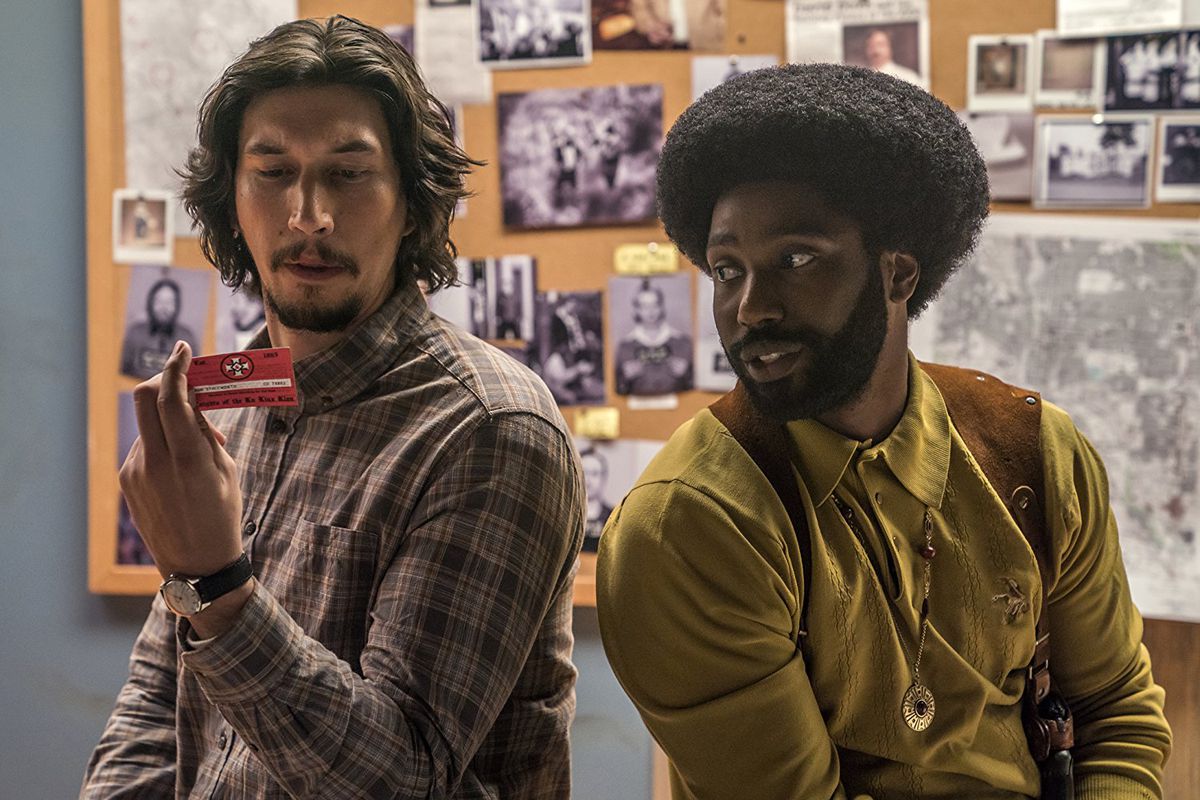America cinema has a strange relationship with racism, and BlacKkKlansman knows it. The film commences with a short snippet from Gone with the Wind showing Scarlett O’Hara running through a field of wounded soldiers while sombre music plays, ending with the camera panning to a Confederate battle flag softly fluttering in the wind, and later features the knights of the Ku Klux Klan riding off to victory in D.W. Griffith’s Birth of a Nation. It’s certainly troubling in a modern context, and a touch obvious, but Director Spike Lee doesn’t shy away from trouble, or from being a touch obvious. Lee is certainly no stranger to the subject of race and racism in the United States of America, making his name with films like Do the Right Thing, Jungle Fever, and Malcolm X, and BlacKkKlansman follows them with it’s stark and severe subject matter and critical eye. Based on the the true story of former Police Officer Ron Stallworth’s infiltration of the Ku Klux Klan, the film deftly balances humorous, mocking moments with some truly disturbing ones, and while this tonal dichotomy does lead to some conflicting segments, for the most part the film is absolutely riveting.
The plot and the way it is presented is one of the film’s biggest strengths, but also a noticeable weakness. Starting off at a breakneck pace, Lee condenses much of the setup and background exposition into the first ten minutes, then slows the pace down as the story continues. This works to great effect, allowing the audience to form an understanding of the ins and outs of the films world whilst also leaving a good deal of room for development. The problem arises when the film continues to slow and starts to segment itself into a few separate threads, which do work fantastically well together at select moments but at the three quarter mark start to unravel and become difficult to follow until they are loosely tied up in the films final scenes. The story itself is handled quite brilliantly; whilst Lee showcases the inherent ridiculousness of the Klansmen, their questionable intellects, and their scattershot dogma, they’re never depicted as being ineffectual or immaterial, rather as real people with real impact. There’s been a trend lately to tackle racism through allegory or humour, taking a metaphorical or lampooning perspective the issues to make them more digestible, but in an intensely refreshing turn Lee drives everything home with very little subtlety. in any other film it would feel boorish and obnoxious, but BlacKkKlansman understands the importance and the ramifications of it’s subject matter, and it’s heartening to see any film take such a strong stance on a contentious social issue. The film’s final moments, for example, would be ridiculous in nearly any other film, but because of the uniformity of Lee’s depictions of racism, they’re nothing short of harrowing.
The style of the film is certainly coloured heavily by the period, and not just the flared and colourful ’70s outfits. There’s not much overt style or inventiveness to the photography or the lighting, but there are a few interesting shots, and overall the plain style functions in tandem with the straightforwardness of the plot in presenting very little nuance. Lee’s trademark eclectic editing style is toned down but still evidently present, and the soundtrack was a present surprise, containing a few ’70s radio standards but mostly consisting of musical pieces that were oddly reminiscent of a more funk-charged Miami Vice, Ron’s theme being of particular note. Wonderful performances are featured all around, particularly Topher Grace’s ineptly hilarious portrayal of Klan Grand Wizard David Duke and John David Washington’s lead performance as Ron Stallworth, which is quietly introspective and filled with a rich emotional turmoil that makes him fascinating whilst still being a basic enough character to be instantly accessible. Adam Driver was also excellent as Stallworth’s white counterpart ‘Flip’ Zimmerman, though his character’s internal conflict wasn’t explored anywhere near as much as he could have been, resulting in what is ultimately an interesting but disappointing plot thread.
BlacKkKlansman isn’t afraid incredibly straightforward with it’s anti-racist message, and though there’s a few points where it becomes either overly dramatic or loses it’s feeling of total investment, for the most part it is a sobering and painfully honest look at the disturbing prevalence of hatred in modern society, and how it festers in the dark and hides in the open.






